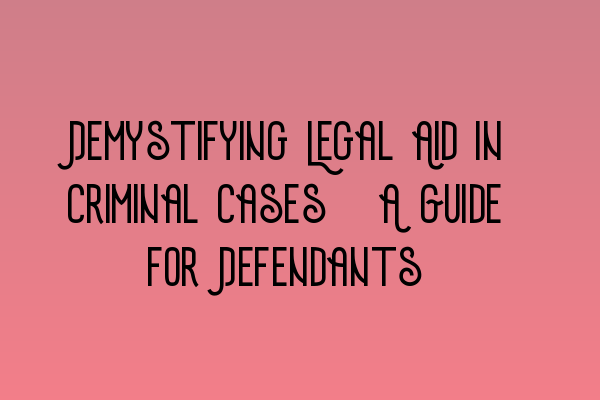Demystifying Legal Aid in Criminal Cases: A Guide for Defendants
Being accused of a criminal offense is an incredibly stressful and challenging experience. In such situations, it is essential to understand your rights and options, including accessing legal aid. Legal aid provides financial assistance to individuals who cannot afford to pay for legal representation, ensuring fairness and access to justice for all.
What is Legal Aid?
Legal aid is a government-funded program that helps individuals with limited financial resources to obtain legal representation in criminal cases. The aim is to ensure that everyone, regardless of their financial circumstances, has equal access to legal services.
As a defendant, you have the right to legal representation, and legal aid can cover the costs of hiring a solicitor or barrister to defend your case. This guarantees that you have professional support and guidance throughout the legal process.
Eligibility for Legal Aid
Eligibility for legal aid is determined based on two primary factors: your financial circumstances and the seriousness of the case against you. The means test assesses your income, savings, and assets to determine whether you qualify for legal aid.
While the financial criteria may vary depending on the jurisdiction, it generally considers your income, such as wages, benefits, and pension, as well as any capital or savings you possess. Certain exemptions and allowances may also apply, taking into account exceptional expenses or circumstances.
The seriousness of the case is evaluated by considering the potential penalty if convicted, the complexity of the legal issues involved, and whether the case involves public interest factors. This assessment helps ensure that legal aid is allocated to those who need it the most.
Types of Legal Aid
Legal aid is available in different forms, depending on the nature of your case. Here are the types of legal aid you may be eligible for:
- Legal Representation: This covers the cost of hiring a solicitor or barrister to represent you in court.
- Legal Advice: If you require legal advice but do not need representation in court, legal aid can cover the fees for consultations and guidance from qualified professionals.
- Legal Assistance at the Police Station: If you are arrested or taken to a police station for questioning, legal aid can provide you with immediate legal assistance.
It is important to note that legal aid is subject to certain limitations. For instance, if you are found guilty and ordered to pay fines or compensation, you may be required to repay some or all of the legal aid costs.
Applying for Legal Aid
To apply for legal aid, you will need to complete an application form provided by the legal aid agency in your jurisdiction. The form will require detailed information about your financial circumstances, such as your income, savings, and any dependents.
It is crucial to provide accurate and honest information, as providing false or misleading details can have serious consequences. The legal aid agency will assess your application and inform you of the outcome, including whether you are eligible for legal aid and any contribution you may need to make.
Conclusion
Legal aid plays a vital role in ensuring access to justice for individuals facing criminal charges. By demystifying legal aid and understanding the eligibility criteria, types of assistance available, and the application process, defendants can make informed decisions regarding their legal representation.
If you are preparing for the SQE exams, consider checking out our related articles for valuable resources:
